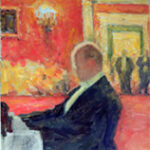Bard Music Festival, Bard SummerScape
Bard Music Festival Presents: Sergey Prokofiev and His World
August 8–17, 2008
Bard Music Festival, Bard SummerScape
August 8–17, 2008


Summerscape and Bard Music Festival 2008 tickets are on sale now!
Click here to order tickets online or call (845)758-7900
NINETEENTH SEASON
Program details:
Weekend 1
Weekend 2
Weekend 3
Three composers educated in Russia before and after the Revolution of 1917 rose to nearly unparalleled prominence during the 20th century: Stravinsky, Prokofiev, and Shostakovich. Of the three, Sergey Prokofiev is perhaps the most popular but least well understood and closely studied. Like Stravinsky, Prokofiev left Russia, but unlike him returned voluntarily in the mid 1930s to live out one of the most productive periods of his career in Stalin’s Russia. Ironically, he died on the very same day as Stalin. Like Stravinsky, Prokofiev lived and worked in France and the United States. In contrast to Shostakovich, who never emigrated, Prokofiev did not only survive Stalin but never assumed a place as an official symbol of the Soviet regime. Like his two contemporaries, Prokofiev showed a striking versatility as a composer and a performer.
Prokofiev is best remembered for a few popular scores, including Peter and the Wolf and Romeo & Juliet. His various works for the violin, piano, flute, and cello became standard in the repertoire of the 20th century. But much of his music is not well known, and the twists and turns in his career and style demand close inspection and reconsideration. Likewise, his views on art, politics, and the spiritual challenges of modern life require an understanding of the several worlds in which he worked: the St. Petersburg of his youth, Paris in the interwar period, and the United States, where he lived periodically and where he composed his greatest operatic success, The Love for Three Oranges. His career taken as a whole allows us to rethink the nature of modernism and the connection of music to 20th-century politics and culture in Russia, Europe, and America.
The Bard Music Festival offers the first close examination of Prokofiev’s life and career since the historical archives left behind in Russia at his death were partially opened in 2003. Prokofiev’s public was the widest and most international of the three great 20th-century Russian masters. His music reached not only the Soviet masses, but it also had a decisive following in the West. It was never too closely associated with Soviet communism. Therefore, this year’s Bard Music Festival will not be exclusively a rediscovery, but a comprehensive reconsideration of a well known figure whose personality and achievement have until now only been understood in a fragmentary and selective manner. The festival will present not only a wide range of Prokofiev’s work, but also music by his teachers, contemporaries, and successors, including Sergey Taneyev, Aleksandr Glazunov, Igor Stravinsky, Francis Poulenc, Darius Milhaud, John Alden Carpenter, and Serge Rachmaninoff, among others. The 19th volume in the award-winning Bard Festival series published by Princeton University Press will be Prokofiev and His World, edited by Simon Morrison.
This season is made possible in part by grants from the National Endowment for the Arts, New York State Council on the Arts, the generous support of the Board of the Bard Music Festival, and the Friends of the Fisher Center. Additional underwriting has been provided by Jeanne Donovan Fisher, James H. Ottaway Jr., Felicitas S. Thorne, Bettina Baruch Foundation, Mimi Levitt, Homeland Foundation, Joanna M. Migdal, Andrea and Kenneth L. Miron, and Margo and Anthony Viscusi.
Programs and performers are subject to change.
Image: Portrait of Sergey Prokofiev at work, 1937, oil on canvas, by Leonid Osipovic Pasternak (1862–1945), Glinka Museum of Music Culture, Moscow, Russia/The Bridgeman Art Library.